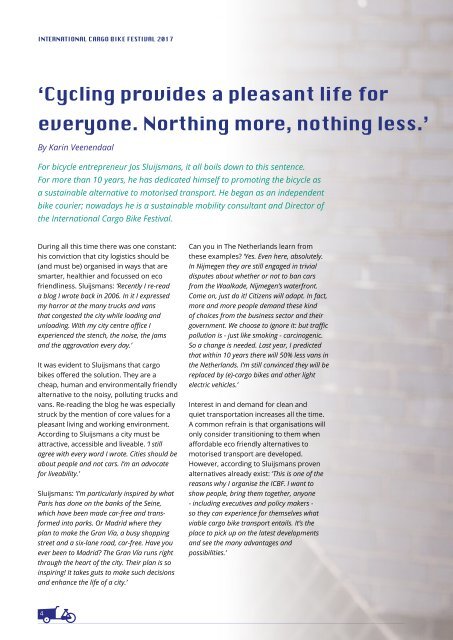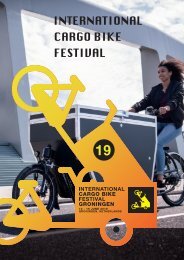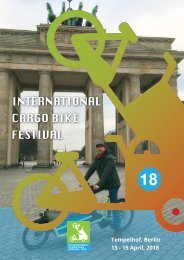You also want an ePaper? Increase the reach of your titles
YUMPU automatically turns print PDFs into web optimized ePapers that Google loves.
By Karin Veenendaal<br />
For bicycle entrepreneur Jos Sluijsmans, it all boils down to this sentence.<br />
For more than 10 years, he has dedicated himself to promoting the bicycle as<br />
a sustainable alternative to motorised transport. He began as an independent<br />
bike courier; nowadays he is a sustainable mobility consultant and Director of<br />
the <strong>International</strong> <strong>Cargo</strong> <strong>Bike</strong> <strong>Festival</strong>.<br />
During all this time there was one constant:<br />
his conviction that city logistics should be<br />
(and must be) organised in ways that are<br />
smarter, healthier and focussed on eco<br />
friendliness. Sluijsmans: ‘Recently I re-read<br />
a blog I wrote back in 2006. In it I expressed<br />
my horror at the many trucks and vans<br />
that congested the city while loading and<br />
unloading. With my city centre office I<br />
experienced the stench, the noise, the jams<br />
and the aggravation every day.’<br />
It was evident to Sluijsmans that cargo<br />
bikes offered the solution. They are a<br />
cheap, human and environmentally friendly<br />
alternative to the noisy, polluting trucks and<br />
vans. Re-reading the blog he was especially<br />
struck by the mention of core values for a<br />
pleasant living and working environment.<br />
According to Sluijsmans a city must be<br />
attractive, accessible and liveable. ‘I still<br />
agree with every word I wrote. Cities should be<br />
about people and not cars. I’m an advocate<br />
for liveability.’<br />
Sluijsmans: ‘I’m particularly inspired by what<br />
Paris has done on the banks of the Seine,<br />
which have been made car-free and transformed<br />
into parks. Or Madrid where they<br />
plan to make the Gran Vía, a busy shopping<br />
street and a six-lane road, car-free. Have you<br />
ever been to Madrid? The Gran Vía runs right<br />
through the heart of the city. Their plan is so<br />
inspiring! It takes guts to make such decisions<br />
and enhance the life of a city.’<br />
Can you in The Netherlands learn from<br />
these examples? ‘Yes. Even here, absolutely.<br />
In Nijmegen they are still engaged in trivial<br />
disputes about whether or not to ban cars<br />
from the Waalkade, Nijmegen’s waterfront.<br />
Come on, just do it! Citizens will adapt. In fact,<br />
more and more people demand these kind<br />
of choices from the business sector and their<br />
government. We choose to ignore it: but traffic<br />
pollution is - just like smoking - carcinogenic.<br />
So a change is needed. Last year, I predicted<br />
that within 10 years there will 50% less vans in<br />
the Netherlands. I’m still convinced they will be<br />
replaced by (e)-cargo bikes and other light<br />
electric vehicles.’<br />
Interest in and demand for clean and<br />
quiet transportation increases all the time.<br />
A common refrain is that organisations will<br />
only consider transitioning to them when<br />
affordable eco friendly alternatives to<br />
motorised transport are developed.<br />
However, according to Sluijsmans proven<br />
alternatives already exist: ‘This is one of the<br />
reasons why I organise the ICBF. I want to<br />
show people, bring them together, anyone<br />
- including executives and policy makers -<br />
so they can experience for themselves what<br />
viable cargo bike transport entails. It’s the<br />
place to pick up on the latest developments<br />
and see the many advantages and<br />
possibilities.’<br />
4






